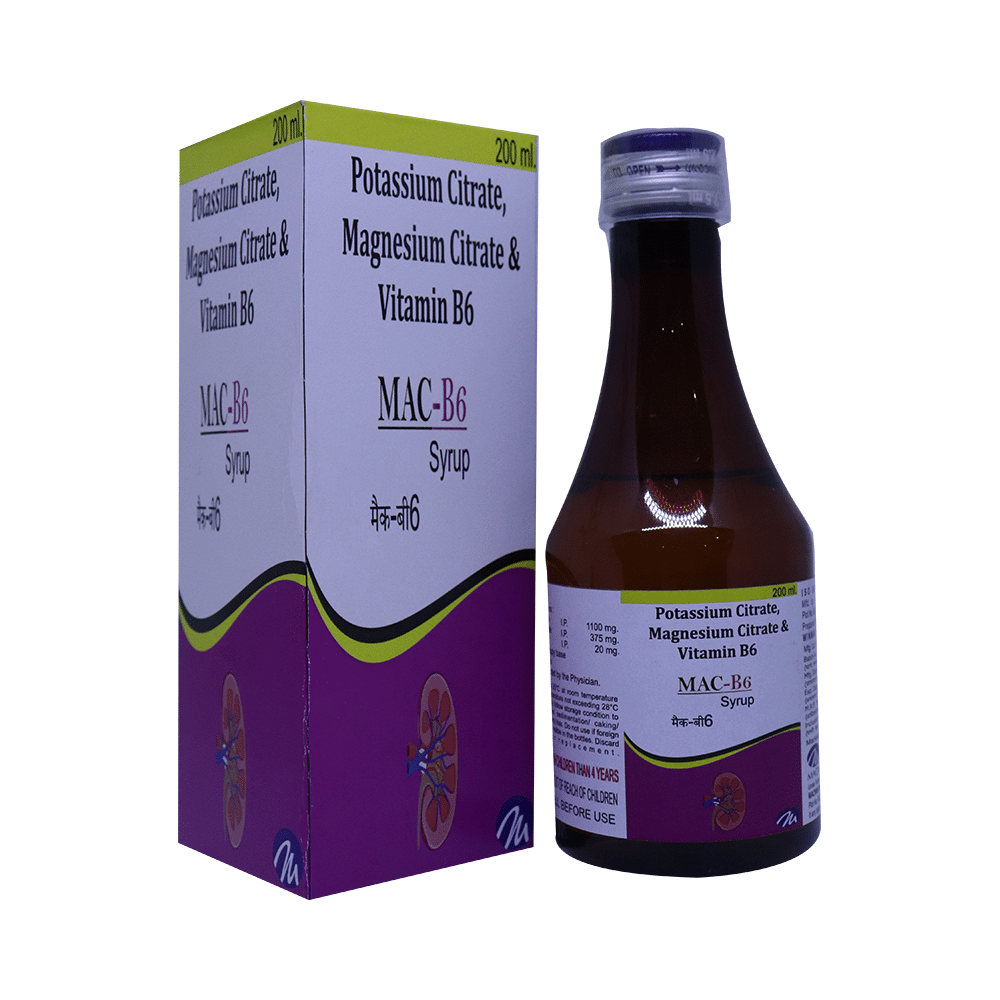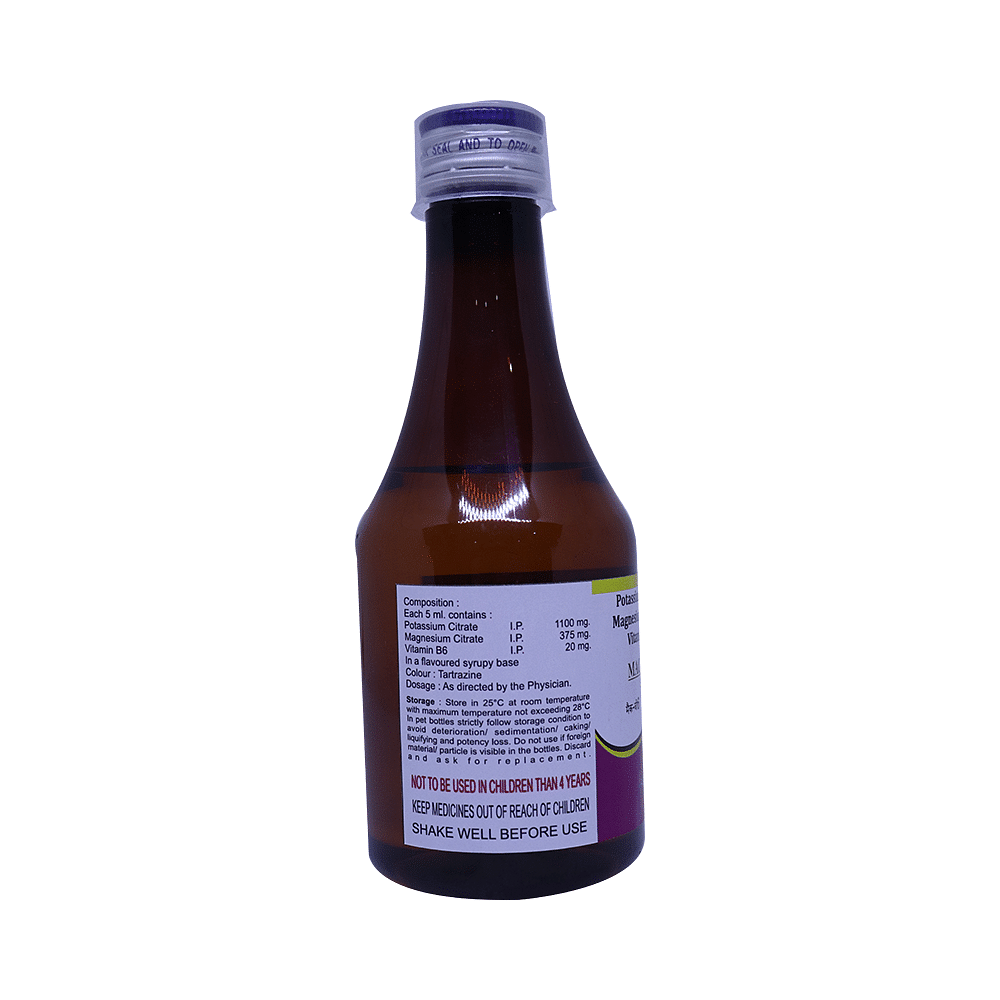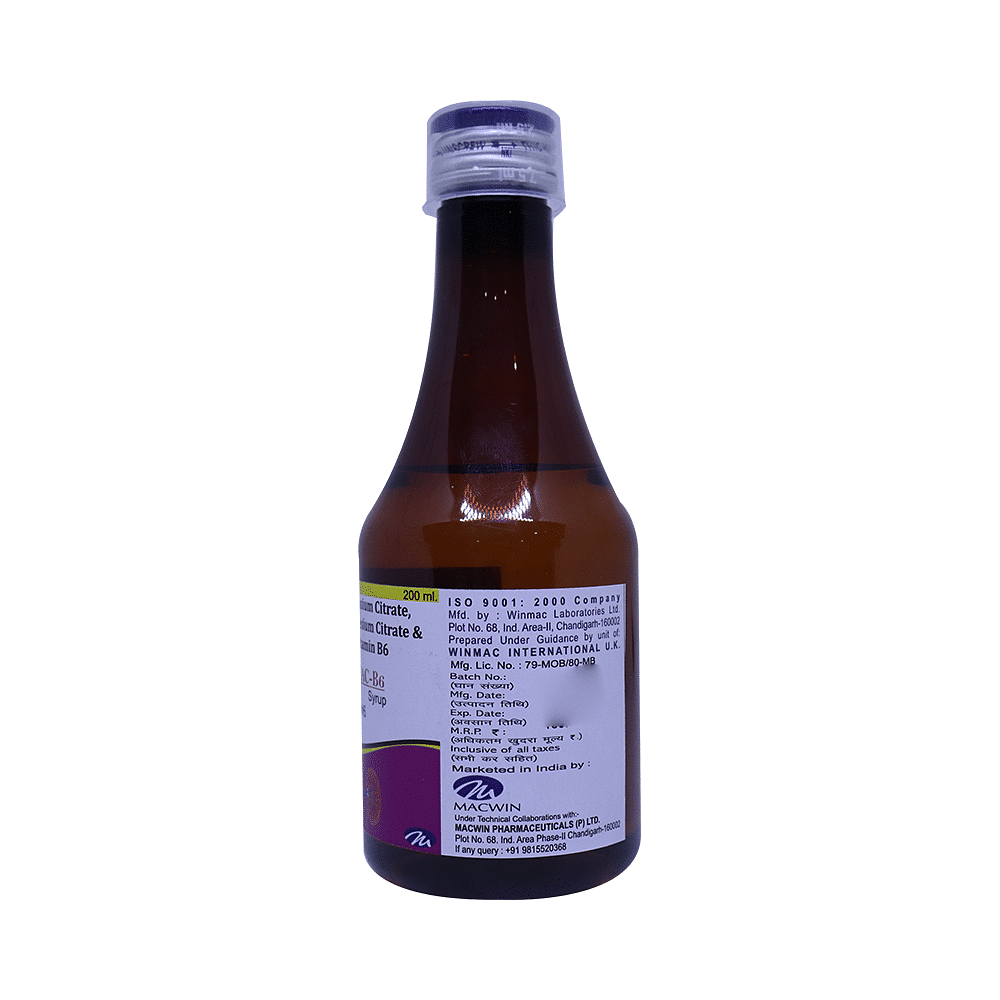


Mac-B6 Syrup
Manufacturer
Winmac Laboratories Ltd
Salt Composition
Potassium Citrate (1100mg/5ml) + Magnesium Citrate (375mg/5ml) + Vitamin B6 (Pyridoxine) (20mg/5ml)
Key Information
Short Description
Mac-B6 Syrup is a combination of three medicines used in the treatment and prevention of kidney stones. It works by preventing the formation and breaking down crystals in the kidneys.
Dosage Form
Syrup
Introduction
Mac-B6 Syrup may be prescribed alone or in combination with other medicines. It should be taken with food. Measure the solution and dilute it in a glass of water before taking it. Take it regularly and do not take more or use it for a longer duration than recommended by your doctor. You should not stop taking the medicine until your doctor tells you it is okay to stop.
Directions for Use
Take this medicine in the dose and duration as advised by your doctor. Check the label for directions before use. Measure it with a measuring cup and take it by mouth. Shake well before use. Mac-B6 Syrup is to be taken with food.
How it works
Mac-B6 Syrup is a combination of three medicines: Potassium Citrate, Magnesium Citrate, and Vitamin B6 (Pyridoxine) which prevent kidney stones. Potassium Citrate and Magnesium Citrate raise urine pH and prevents the formation, growth, and aggregation of crystals in the kidneys, thereby preventing stones. Vitamin B6 (Pyridoxine) is added as its deficiency is associated with increased synthesis of oxalate, which is one of the constituents of kidney stones.
Quick Tips
Always measure the solution with a cup cap and dilute it with a glass of water before taking it. Take adequate water or fluids while taking Mac-B6 Syrup to prevent kidney stones. You can also include citric acid-rich food in your diet like grapefruit, oranges, lemons, or limes to prevent kidney stones. Inform your doctor if you have any kidney or heart disease or high potassium levels in your blood.
Frequently asked questions
How should I take Mac-B6 Syrup?
Mac-B6 Syrup should be taken as directed by the treating physician. Always dilute the dosage recommended by your doctor with one glass of water before taking it.
Who should not take Mac-B6 Syrup?
Mac-B6 Syrup is contraindicated for individuals with: - **High potassium levels (hyperkalemia):** Taking Mac-B6 Syrup may lead to a further increase in potassium levels, which can be life-threatening. This applies to people with chronic renal failure, uncontrolled diabetes mellitus, acute dehydration, those who engage in strenuous exercise, or those suffering from adrenal insufficiency, extensive tissue breakdown, or taking potassium-sparing agents (such as triamterene, spironolactone, or amiloride). - **Conditions that affect gastric emptying, esophageal compression, intestinal obstruction or stricture:** Individuals experiencing these conditions should also refrain from taking Mac-B6 Syrup. - **Anticholinergic medications:** People taking anticholinergic medications alongside Mac-B6 Syrup should avoid it. - **Certain pre-existing medical conditions:** If you have peptic ulcer disease, active urinary tract infection, or renal insufficiency (glomerular filtration rate less than 0.7 ml/kg/min), consult your doctor before taking Mac-B6 Syrup.
Can I take Mac-B6 Syrup during pregnancy?
There is insufficient evidence regarding the use of Mac-B6 Syrup in pregnancy. Consult your physician before using it during pregnancy if you are pregnant or plan to conceive. Use only if prescribed by your doctor.
Are there any foods that should be avoided while taking Mac-B6 Syrup?
Consuming high potassium foods, like almonds, apricots, bananas, beans (lima, pinto, white), cantaloupe, carrot juice (canned), figs, grapefruit juice, halibut, milk, oat bran, potato (with skin), salmon, spinach, etc., is recommended to avoid while taking Mac-B6 Syrup. It's advisable to consult a registered dietitian for dietary recommendations that meet your individual needs.
What should I tell my doctor before starting treatment with Mac-B6 Syrup?
Inform your physician of any pre-existing medical conditions, especially those related to kidney, stomach, or heart health. This is essential as certain conditions can affect your medication and necessitate dosage adjustments.
What medicines should I avoid while on treatment with Mac-B6 Syrup?
In conjunction with using Mac-B6 Syrup, you must avoid: - **Potassium-sparing diuretics:** These medications contain potassium and may elevate it further. - **Angiotensin Receptor Blockers (ARBs):** Such as irbesartan, valsartan, losartan, and candesartan. - **Angiotensin-Converting Enzyme inhibitors (ACE inhibitors):** Like captopril, enalapril, lisinopril. - **Nonsteroidal anti-inflammatory drugs (NSAIDs):** such as ibuprofen. - Certain nutritional supplements that can raise potassium levels


